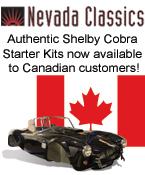 
 Main Menu
Main Menu
|
 Nevada Classics
Nevada Classics
|
 Advertise at CC
Advertise at CC
|
 February 2026
February 2026
|
| S |
M |
T |
W |
T |
F |
S |
| 1 |
2 |
3 |
4 |
5 |
6 |
7 |
| 8 |
9 |
10 |
11 |
12 |
13 |
14 |
| 15 |
16 |
17 |
18 |
19 |
20 |
21 |
| 22 |
23 |
24 |
25 |
26 |
27 |
28 |
|
 CC Advertisers
CC Advertisers
|
|
 59Likes 59Likes

11-17-2016, 05:28 AM
|
|
CC Member

|
|
|
Join Date: Dec 2001
Location: Louisville,
KY
Cobra Make, Engine: I'm Cobra-less!
Posts: 9,417
|
|

 Not Ranked
Not Ranked
 What's the appeal of an aluminum engine block?
What's the appeal of an aluminum engine block?
I've always wondered why a lot of my customers requested aluminum blocks for their FE builds. I have asked one or two of my patrons the reasons for their choice and the answers usually revolved around weight.
Is that the most common reason?
Or is just the exotic-ness (is that a word?) of having an "all-aluminum engine"?
Here's my side of it....
At the quantity level that aftermarket FE blocks are manufactured, the quality will always be a variable. If the blocks were made by a big name manufacturer, such as Ford Racing, Dart, World Products, etc., where the quality could be nailed down, it may be a different story.
Now, I will say that the manufacturers that I work with are top notch on customer service and will usually fix or reimburse for any problems that come up. However, the downtime and hassle simply aggravate me.
I've never had an issue with any aftermarket cast iron block but I've experienced quite a few casting flaws on aluminum blocks that would have induced severe internal water leaks if they had not been discovered before-hand. These are usually caught on a pressure test before machine work begins but will still set a build back by a few weeks at the least.
The sleeves can also cause issues. It is nice to have a block that can essentially have the cylinders replaced at will, but it does make for a hairy situation at the beginning as all the sleeves have to be set. This involves the use of an oven and a torque plate to push the sleeves down as far as they will go, so they will not drop when the assembled engine is running and has heat in it.
Aluminum blocks just don't make the same horsepower that a cast iron block will make with an equivilent build. The blocks expand, move around, etc., which can reduce ring seal and the amount of power that's made. Due to the expansion rate of aluminum, main bearing clearances have to be adjusted while assembling, to allow for the clearances opening up under operating temperature.
On the positive side of things, the aluminum blocks are lighter. However, this doesn't really mean much for the average Cobra owner. If you are racing, this may be a concern, but for the regular street car build, I personally see no benefit.
So, the motive behind my long-winded post was actually two-fold. The first motive was just to poll the Club Cobra crowd to see what the consumer level of thinking was behind the aluminum blocks. The second motive was just to vent a little bit. I have made the decision to not accept any more all-aluminum FE build orders. Not sure if I will retract that decision later on down the road, but to me, the pros just don't outweigh the cons and if an issue occurs on a build, the builder is always the one to incur the cost.
As some of you know, aftermarket FE blocks have been non-existent this year. I've been waiting on blocks since February and still have not received any. Foundries have changed, designs have changed, and until things settle down, I just have to go with my gut.
|
-
Advertising


11-17-2016, 05:57 AM
|
|
CC Member

|
|
|
Join Date: Sep 2001
Cobra Make, Engine:
Posts: 679
|
|

 Not Ranked
Not Ranked
I call them cool guy parts in the Buick turbo world. Bragging rights  Now in the COBRA world I felt better with it because of all the 427s we had in the 60/70s that guys blew up.. Trying to find a really nice cast iron block could be challenging. On the good side less weight on the nose. Really haven't beat on it bad. Still have little V6 Turbo's if I want a hell ride. Plus we have a lot of parts from hoarding 
__________________
Dan
427 CSX 3000/4000 and Shelbys.
All gone ! Was a Hell of a run 
Now ... The dogs car
Mercedes E63S station wagon. 603hp 
|

11-17-2016, 06:08 AM
|
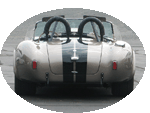 |
Half-Ass Member

|
|
|
Join Date: Jun 2005
Cobra Make, Engine: ERA #732, 428FE (447 CID), TKO600, Solid Flat Tappet Cam, Tons of Aluminum
Posts: 22,025
|
|

 Not Ranked
Not Ranked
Quote:
Originally Posted by blykins

I have made the decision to not accept any more all-aluminum FE build orders. Not sure if I will retract that decision later on down the road, but to me, the pros just don't outweigh the cons and if an issue occurs on a build, the builder is always the one to incur the cost.
|
Bad idea. Remember, you are a not a physician; you have no duty to "do no harm." Rather, you inform your customer with your professional opinion, if the customer wants to be informed. But then you build what you are paid to build. Just inform the customer on all the down sides, and if that's what the customer wants, then that's what the customer gets. Think of yourself as a tattoo artist -- if the customer wants it, and the customer pays for it, then the customer gets it... even if you think it's a bad idea.  |

11-17-2016, 06:10 AM
|
|
CC Member

|
|
|
Join Date: Dec 2001
Location: Louisville,
KY
Cobra Make, Engine: I'm Cobra-less!
Posts: 9,417
|
|

 Not Ranked
Not Ranked

Wrong.
What happens if a sleeve drops (had that happen once) and you don't find out until you get ready to pull it off the dyno and pull the valve covers to do an inspection?
You think the customer pays for that?
What happens if there's a pin hole leak in a lifter bore that wasn't caught until it's on the dyno and running? You don't just fix that stuff without tearing the engine completely down to bare bones.
I don't give prices only to have to take $1000 profit out of it at the end because of a manufacturing defect.
It would be simple if there were no risks to the builder and all I had to do was present the pros/cons to the customer. However, it doesn't work that way.
Why do you think there are regular street build aluminum FE blocks running around with lifter bore bushings? That's something that's not necessary unless we've gone to a .904" lifter, etc. However, there have been pin hole leaks in lifter bores and the fix is either to snag a new block or put lifter bore bushings in. That stuff ain't free.
Last edited by blykins; 11-17-2016 at 06:16 AM..
|

11-17-2016, 06:19 AM
|
 |
Half-Ass Member

|
|
|
Join Date: Jun 2005
Cobra Make, Engine: ERA #732, 428FE (447 CID), TKO600, Solid Flat Tappet Cam, Tons of Aluminum
Posts: 22,025
|
|

 Not Ranked
Not Ranked
Then you restructure your pricing to reflect those prospective risks. You do not just "close the door" on risky builds. Rather, you price them accordingly and clearly, and plainly, convey the risk to the buyer. There are a lot of professions were the professional does not "guaranty their success." They simply pledge to do their best. Breaking in a SFT cam is a good example. If you do your best, and it goes south, the cost should be on me, not you.  |

11-17-2016, 06:21 AM
|
|
CC Member

|
|
|
Join Date: Dec 2001
Location: Louisville,
KY
Cobra Make, Engine: I'm Cobra-less!
Posts: 9,417
|
|

 Not Ranked
Not Ranked
Yeah, in a perfect world, that's how it is.
However, there are certain things called warranties. IMO, the customer should not have to incur damages because of a manufacturing defect either....flat tappet camshaft, aluminum block, bad crank, etc.
I like how you think though....
Also can't just raise my prices to cover things that "might" happen. I would price myself out of every engine build if I had to do that.
|

11-17-2016, 06:29 AM
|
 |
Half-Ass Member

|
|
|
Join Date: Jun 2005
Cobra Make, Engine: ERA #732, 428FE (447 CID), TKO600, Solid Flat Tappet Cam, Tons of Aluminum
Posts: 22,025
|
|

 Not Ranked
Not Ranked
Quote:
Originally Posted by blykins

Also can't just raise my prices to cover things that "might" happen. I would price myself out of every engine build if I had to do that.
|
Well, I don't know enough about the engine building business to know how far you can successfully "hedge your risk." You know a certain percentage of a certain type of build will incur problems. If you hedged all of those builds, with a surcharge, that charge, combined, could cover the costs of fixing the occasional crapper. That's how you do it in most markets. But from a business perspective, you don't turn down business. Instead, adopt this mantra: If you throw enough money at me, I will do it. I might not succeed, but I will do it. EDIT
EDIT: and more often than not, you will succeed.
Last edited by patrickt; 11-17-2016 at 06:31 AM..
Reason: added the last line
|

11-17-2016, 06:34 AM
|
|
CC Member

|
|
|
Join Date: Dec 2001
Location: Louisville,
KY
Cobra Make, Engine: I'm Cobra-less!
Posts: 9,417
|
|

 Not Ranked
Not Ranked
Nah, I look at it like this: if there's a higher than normal chance that it's going to be a pain in my butt, I'm not going to do it.  There's a very high chance that a cast Eagle FE crank is going to break off at the front rod journal. Now, should I use that crank, upcharge for it, or should I avoid it altogether so I don't have to incur any damages, risks, or time setbacks?
I have a backlog of builds right now. It's just me doing it. Stopping everyone else's build because of a build with issues absolutely ruins my day.
Ok, so who's going to answer the question without trying to give me business tips? |

11-17-2016, 06:44 AM
|
 |
CC Member

|
|
|
Join Date: Apr 2009
Location: Little Rock area,
AR
Cobra Make, Engine: ERA Street Roadster #782 with 459 cu in FE KC engine, toploader, 3.31
Posts: 4,533
|
|

 Not Ranked
Not Ranked
It's your business and bottom profit line. If someone has a serious enough thing about an aluminum block they will find someone else to build it.
Personally, if it were my business I would like to think I had a higher standard than the average tattoo artist.  |

11-17-2016, 06:46 AM
|
 |
CC Member

|
|
|
Join Date: Jun 2014
Location: Dallas,
TX
Cobra Make, Engine: ERA #812 427/482 FE
Posts: 495
|
|

 Not Ranked
Not Ranked
I chose an aluminum block for my build simply because of weight savings. I didn't want the car to be nose heavy. I was not aware that using an aluminum block posed additional risk to the engine builder.
__________________
Chris
|

11-17-2016, 06:49 AM
|
|
CC Member

|
|
|
Join Date: Dec 2001
Location: Louisville,
KY
Cobra Make, Engine: I'm Cobra-less!
Posts: 9,417
|
|

 Not Ranked
Not Ranked
I'd like to hear a chassis guy's thoughts on how the aluminum block actually affects the C/G and handling of a Cobra. The engine sits much further back in a Cobra than a normal vehicle. IMO, you'd only be able to tell the difference if you were really giving it grief on a road course. And at that point, the entire engine build and car setup should be changed.
Another "con" of an aluminum block build that I failed to mention above, is that they are harder to get them sealed up. Since the blocks "move around" so much with heat expansion, it can cause issues with gasket sealing.
|

11-17-2016, 07:08 AM
|
|
CC Member

|
|
|
Join Date: Dec 2012
Cobra Make, Engine:
Posts: 973
|
|

 Not Ranked
Not Ranked

I'm with you Brent. As a business man you are in charge and your reputation is all you have. Without it you don't have a business or customers. If somebody insists on doing something you feel will fail you have the right to refuse it. No reasonable amount of money or written disclaimers are enough to offset the power of an angry customer who trashes your name across the internet because he feels he was taken to the cleaners. It doesn't matter if you warned him or had him sign off that you can't back the decision - These people only hear what they want to hear and believe what they want to believe. They are toxic to your business. There will always be somebody "cheaper" and somebody who will gladly accept money who will agree to to the job. Let them have that customer if you can't convince the customer that what you are offering is "better".
A couple years ago I had a car with a Pond aluminum FE block. I've had several with cast iron blocks. I could care less about if I had an aluminum or Iron block. There are so many more important variables in an engine build that make the car more enjoyable to drive. I was able to command a higher price for the Al block car for some reason. I think it's all perceived value - no different than people paying more for a CSX replica than an equally equipped KMP. I had a potential customer who missed out buying my car with the Al block and he's regretted it since and now has me looking for another one for him to buy. I've offered him several without the Al block and he now is not interested in them. Reason? I haven't heard one. I think it's just bragging rights.
__________________

Last edited by 66gtk; 11-17-2016 at 07:19 AM..
|

11-17-2016, 07:10 AM
|
 |
CC Member

|
|
|
Join Date: Aug 2015
Cobra Make, Engine: All original, with Chevy engine since 1964
Posts: 996
|
|

 Not Ranked
Not Ranked
Quote:
Originally Posted by Blue66

I call them cool guy parts in the Buick turbo world. Bragging rights  |
I'm with this guy...- Most dudes are going to tell you they want aluminum instead of iron for both the reasons you mentioned - Weight, and for the "cool factor"
But my personal opinion is that these 2 reasons mask the real rationale, which is technical ignorance, augmented by a fat checkbook...
"A fool, and his money, are soon parted"
- Benjamin Franklin.
It's the same reason that guys are coming to you asking for a 700hp solid roller, for a car that they put 500 miles a year on, driving around to car shows and parking lot meets. 
Bench racing is fun, without being nearly as scary, or time consuming, as the real thing... 
__________________
- Robert
|

11-17-2016, 07:11 AM
|
|
CC Member

|
|
|
Join Date: Dec 2001
Location: Louisville,
KY
Cobra Make, Engine: I'm Cobra-less!
Posts: 9,417
|
|

 Not Ranked
Not Ranked
66gtk, Thanks for the words.
I never let an engine leave here with a known issue, even if it requires that the engine be torn completely down, machine work involved, etc. So with that being said, the customer in this instance would never have the opportunity to be upset or angry....but it would just cost me time and money to repair it before it left.
|

11-17-2016, 07:17 AM
|
 |
CC Member

|
|
|
Join Date: Aug 2015
Cobra Make, Engine: All original, with Chevy engine since 1964
Posts: 996
|
|

 Not Ranked
Not Ranked
Quote:
Originally Posted by 66gtk

I think it's all perceived value - no different than people paying more for a CSX replica than an equally equipped KMP.
|
^^^^ Yeah, that.... 
__________________
- Robert
|

11-17-2016, 07:26 AM
|
|
CC Member

|
|
|
Join Date: Dec 2001
Location: Louisville,
KY
Cobra Make, Engine: I'm Cobra-less!
Posts: 9,417
|
|

 Not Ranked
Not Ranked
If I were building such a high level car as a KMP or CSX, where originality is certainly a big part of it, I'd want a cast iron block. JMO though.
|

11-17-2016, 08:20 AM
|
|
CC Member

|
|
|
Join Date: Jan 2005
Location: Hillsboro,
OR
Cobra Make, Engine: Scratch built CSX style frame, Carbon fiber body, 393 Stroker, T-bird IRS, T5
Posts: 1,623
|
|

 Not Ranked
Not Ranked

A lot of very valid points here. When I had my business, (electrical contractor) the one thing I tried hardest to protect was my reputation. With substandard parts in the mix and a demanding customer, you can't be careful enough to avoid every pitfall. And there is always that customer that doesn't understand anything but money and schedule so no excuse in the world will smooth out the lack of trust when a problem comes up.
I worked for free many times to take care of an issue that came up at the last minute so we could meet a schedule or keep a customer happy. Most times the customer never even was aware we did it so he was blissfully happy his project was done on time and on budget.
However, when I have work done I try to use the most experienced and referenced people I can find. For things like engine work I have enough experience to know when I guy is BS'ing me or not. If a reputable builder in just about any field tells me they won't do something because there are issues that aren't worth the effort, they get my attention. When a pro tells me to buy something cheaper, but better, I tend to listen up to his recommendations and ask lots of questions so I understand his reasoning. If it is sound I will usually use that pro for my work as I like to work with honest people. The few times I've disregarded good advice I've paid the price almost every time.
Long story short, if your customers trust you they will strongly consider your recommendations and reasoning. If they don't, no amount of reasoning will sway them around and they are only looking for the bragging rights, IMHO.
As far as the weight issue, I've done a bit of studying and the cast iron FE blocks fully built out are really only about 100-150 lbs heavier than the 351W cast iron blocks built out. With the weight bias in these cars that only totals out to approximately half that additional weight on the front of the car. Not many guys who are street or even autocross drivers are going to notice that amount of difference given proper springs to compensate for the weight and proper set up and alignment on the car, IMHO.
Bob
|

11-17-2016, 09:27 AM
|
 |
CC Member

|
|
|
Join Date: Sep 2006
Location: No city...only 118 residents in Manter,
KS
Cobra Make, Engine: Cobra Auto Works body, Ron Godell Racecars chassis, 1989 Mustang GT 5.0 HO (converted to carb), W/C T-5, 3.73's in a Ford 9" Traction-Loc.
Posts: 812
|
|

 Not Ranked
Not Ranked

While I've never had an aluminum block, my understanding is that reducing weight has influence on more than just power:weight ratio...braking and handling are enhanced when vehicle weight goes down.
When I first got my replica (bought it used, but in running condition) the previous owner had not adjusted the idle speed and it was idling at about 1500 RPM...every time I tried to make a turn on a road that had some sand or gravel on it, the vehicle "slid", for lack of a better descriptor. As my engine is all iron, I just attributed that to all the weight in the front of the car (my engine does not sit in the front "cradle" as far back as most, there is about half of the bell-housing visible as I view the back of the engine).
Perhaps the best advice I have gotten was something to the effect of: "Spend your $$ on good brakes and lightening the car, they'll never catch you!
I must admit that as I develop plans for the Clevor build, I always envision it with an all-aluminum block...perhaps that is not the best of ideas?
Cheers!
Dugly 
__________________
YD,E./PNB
No names were changed to protect the innocent! 
|

11-17-2016, 10:27 AM
|
 |
CC Member

|
|
|
Join Date: Jul 2007
Location: Near Daytona Beach,
FL
Cobra Make, Engine:
Posts: 32
|
|

 Not Ranked
Not Ranked
I'm not going too try to replicate an original Cobra with my probable car choice. I had an FE engine in a 1967 Fairlane that I built to look like a 427 car. This will be my next Ford powered toy after a few Chevy powered cars. This time it'll 427 small block. Dart cast iron.
__________________
Looking at Backdraft
|

11-17-2016, 10:59 AM
|
|
CC Member

|
|
|
Join Date: Dec 2001
Location: Louisville,
KY
Cobra Make, Engine: I'm Cobra-less!
Posts: 9,417
|
|

 Not Ranked
Not Ranked

Quote:
Originally Posted by YerDugliness

While I've never had an aluminum block, my understanding is that reducing weight has influence on more than just power:weight ratio...braking and handling are enhanced when vehicle weight goes down.
When I first got my replica (bought it used, but in running condition) the previous owner had not adjusted the idle speed and it was idling at about 1500 RPM...every time I tried to make a turn on a road that had some sand or gravel on it, the vehicle "slid", for lack of a better descriptor. As my engine is all iron, I just attributed that to all the weight in the front of the car (my engine does not sit in the front "cradle" as far back as most, there is about half of the bell-housing visible as I view the back of the engine).
Perhaps the best advice I have gotten was something to the effect of: "Spend your $$ on good brakes and lightening the car, they'll never catch you!
I must admit that as I develop plans for the Clevor build, I always envision it with an all-aluminum block...perhaps that is not the best of ideas?
Cheers!
Dugly  |
Here's the thing.....Dart and Ford Racing make a lot of aluminum Windsor blocks. High quantity. I have a little more faith in them just because of the number of blocks that are sold and the fact that a very large company/foundry is casting them.
With that being said, a Dart aluminum block sells for about $6000. A For Racing block sells for $4200. Considering that you have to pay that much for one and you will actually make less horsepower with an aluminum block, if you're not shooting for a specific curb weight or racing in a class, my advice would be to pass.... |
 Posting Rules
Posting Rules
|
You may not post new threads
You may not post replies
You may not post attachments
You may not edit your posts
HTML code is Off
|
|
|
All times are GMT -7. The time now is 05:11 AM.
|





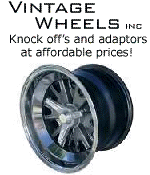



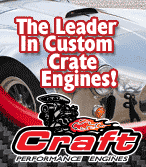



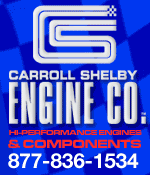
 59Likes
59Likes





 Now in the COBRA world I felt better with it because of all the 427s we had in the 60/70s that guys blew up.. Trying to find a really nice cast iron block could be challenging. On the good side less weight on the nose. Really haven't beat on it bad. Still have little V6 Turbo's if I want a hell ride. Plus we have a lot of parts from hoarding
Now in the COBRA world I felt better with it because of all the 427s we had in the 60/70s that guys blew up.. Trying to find a really nice cast iron block could be challenging. On the good side less weight on the nose. Really haven't beat on it bad. Still have little V6 Turbo's if I want a hell ride. Plus we have a lot of parts from hoarding 


 There's a very high chance that a cast Eagle FE crank is going to break off at the front rod journal. Now, should I use that crank, upcharge for it, or should I avoid it altogether so I don't have to incur any damages, risks, or time setbacks?
There's a very high chance that a cast Eagle FE crank is going to break off at the front rod journal. Now, should I use that crank, upcharge for it, or should I avoid it altogether so I don't have to incur any damages, risks, or time setbacks?


 Linear Mode
Linear Mode



